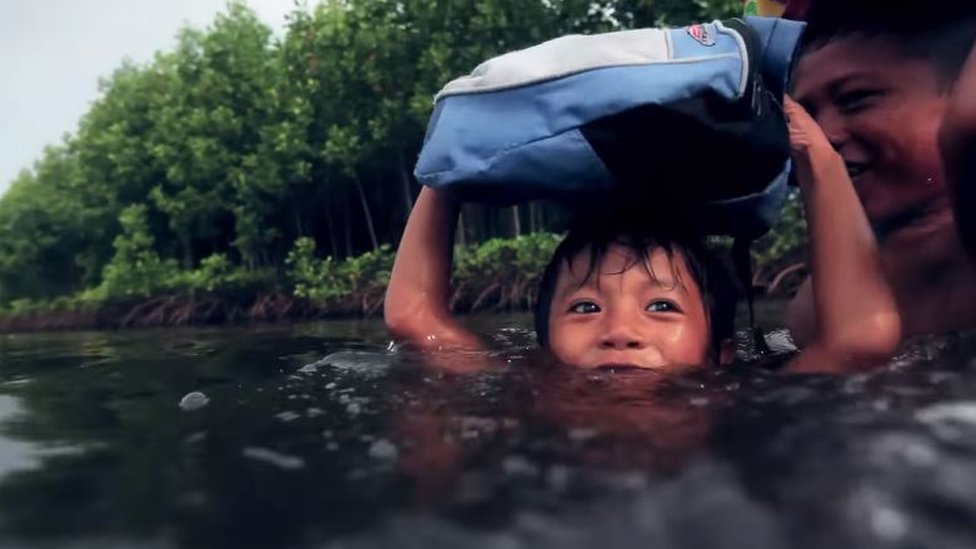
Image copyrightFacebookImage caption What if your daily commute meant swimming through mangroves Imagine if going to school meant swimming and wading through water and mangroves, your school books tied up in a plastic bag over your head.
All the while, you're struggling to keep your face above water and fighting against the current.
For some children in the Philippines, this is a daily routine - but a charity is trying to make it easier for them to get their education by providing communities with boats.The Yellow Boat of Hope Foundation started out as a small idea on social media yet over the years has become a countrywide charity helping school children in need.
The first community where the charity got involved was one of fishermen and seaweed farmers living in stilted houses in the sea off the coast of Zamboanga City, a poor region of Mindanao in the south.
Image copyrightYellow Boat of Hope FoundationImage caption Many communities don't have spare boats for the children The children had to wade as far as one kilometre through water just to get to school.
If the tide was high, the wading became swimming.
"That's dangerous and unsafe even if they are good swimmers," says the charity's founder Jay Jaboneta.
And many of the children are not.
Yet with all the community's boats used for fishing, there's often been no other choice.
The children had to bundle their books and uniforms in plastic bags to keep them dry as they make their long and arduous way to school.
"I didn't know about this situation - when I found out I was shocked and posted about it on Facebook," said Mr Jaboneta, who grew up nearby.
Things then started snowballing when many of his friends responded - and some began pledging money to help the situation.
Image copyrightFacebookImage caption A few hundred dollars are often enough to help Today, the foundation is active all across the Philippines, primarily funding school boats - all painted in bright yellow corresponding to the colour of the country's school buses.
A small boat costs about $200 (150) and will fit around six to eight children, who will have to row it themselves.The bigger boats, some of which even have an engine, are steered by an older student, parent or teacher.
As the charity has grown over the years, they have also taken on some other projects to help poor or remote communities accessing education.
"The problems that such communities face are very different from case to case," explains Mr Jaboneta.
In some projects they've built dormitories for children who otherwise would have to walk for hours to get to school.
One of the latest projects is a large boat equipped with education material so that it can be taken to remote communities by a teacher and serve as a mobile classroom.
Image copyrightYellow boat of hope foundationImage caption The boats are yellow to correspond to the country's school buses Overall, the charity has worked with almost 200 communities since 2010, the founder explains.
"Usually we work with the community leaders or the local schools," says Mr Jaboneta.
"Once we have funded a boat they can then take over the project and operate things themselves."Donations for the work come mostly from the Philippines, he explains.
An exception was 2013, after the country had been battered by deadly typhoon Haiyan - in the wake of this and the global headlines that came with it, there were also some donations from abroad.
But usually, the money comes from locals who want to help making a difference.
Image copyrightYellow Boat of Hope FoundationImage caption Most of the small boats have to be rowed by the pupils themselves Given the project was kick-started on Facebook, it's often praised as an example of what an impact social media can have in stories like this.
And while Mr Jaboneta agrees that his posts at the very beginning were crucial to getting things going, he cautions that there remains a huge offline element to it.
He and co-founder Anton Lim have to call donors, sit down with them, go out and co-ordinate things with the local community leaders - it remains a lot of work, which is still entirely done by volunteers.
"I never imagined that a boat could be something so important, that it could make such a difference," Mr Jaboneta saying, summing up his experience of the past years.
"The Philippines is an archipelago of around 7,000 islands so there are boats everywhere - some estimates say it's about a million across the country.
And so you can easily make the mistake of taking them for granted."

 16
16







